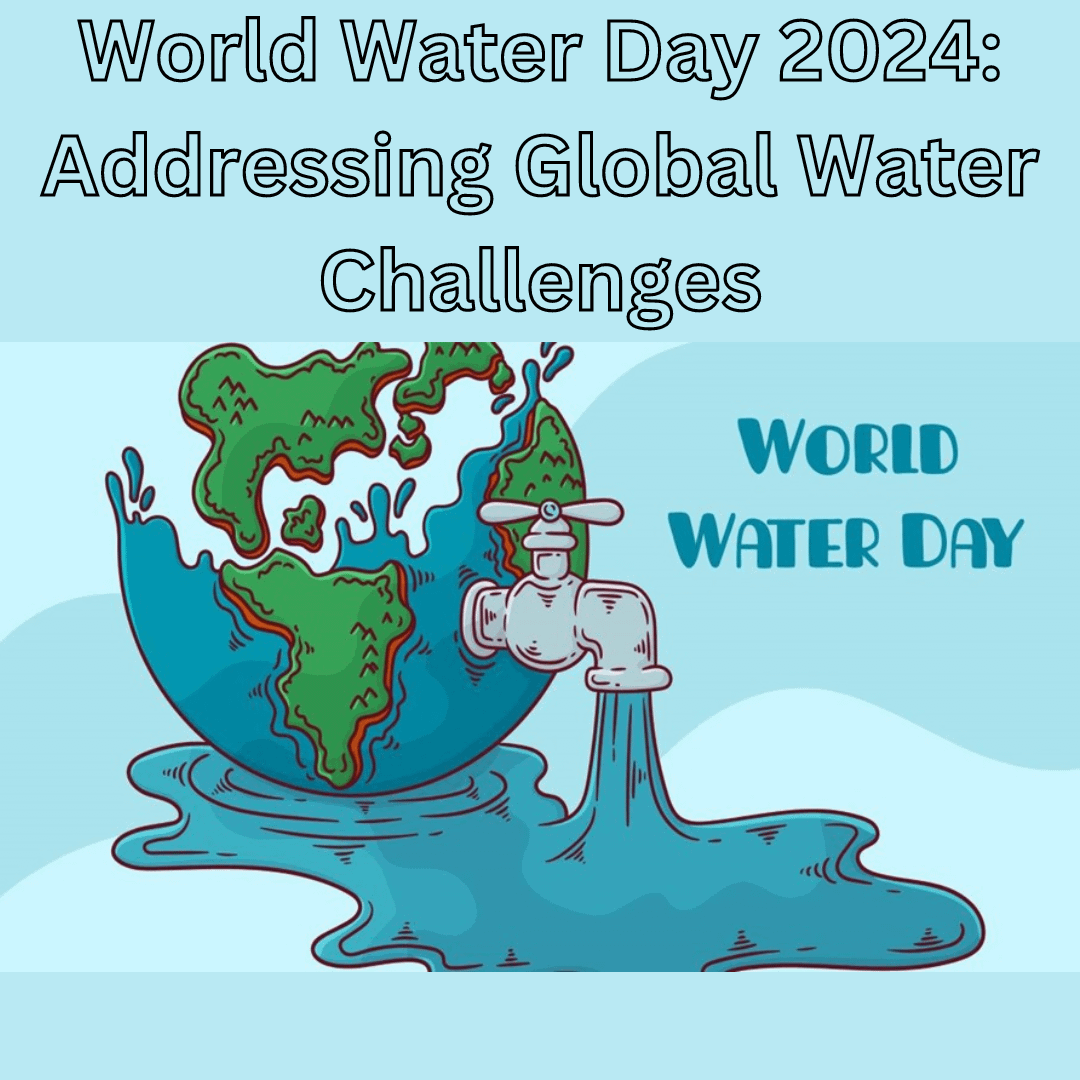Table of Contents

Introduction to World Water Day
Every year on March 22nd, the world observes World Water Day, a day devoted to promoting sustainable water resource management and bringing attention to the value of freshwater. World Water Day was instituted by the United Nations in 1993 to draw attention to the importance of water conservation in reducing poverty, fostering economic development, and protecting ecosystems.
Theme of World Water Day 2024
The topic of this year’s World Water Day is “Water and Climate Change.” It is now more important than ever to solve these issues because pollution and water scarcity are being made worse by climate change. The issue highlights the necessity of holistic approaches to water management and the relationship between water and climate.
Global Water Crisis
A global water crisis is imminent, affecting millions of people who do not have access to safe and clean water. Freshwater resources are under tremendous pressure due to unsustainable water use practices, pollution, urbanization, and rapid population increase. The worldwide water problem jeopardizes biodiversity and ecosystems in addition to endangering human health and well-being.
Water Scarcity and Climate Change
Water scarcity is being made worse by climate change, which is causing glaciers and polar ice caps to melt, changing precipitation patterns, and increasing the frequency of floods and droughts. Numerous locations, especially dry and semi-arid ones, experience increased water stress as a result of these changes to the water cycle. Resilience and water security depend on reducing the effects of climate change.
Innovative Water Conservation Methods
Promising answers to the problems of water scarcity and pollution can be found in innovative technologies and behaviors. There are several strategies to maximize water utilization and reduce waste, from decentralized water treatment facilities to water-efficient irrigation technologies. It is imperative to use these advances in order to construct water systems that are more robust and sustainable.
Community Initiatives for Water Conservation
Since communities are directly touched by pollution and water shortages, they are essential to initiatives to save water. Residents are given the ability to take charge of their water resources through grassroots projects including community-based watershed management programs and rainwater gathering projects. Communities may dramatically increase the availability and quality of water by banding together.
Government Policies and Water Management
Coordinated action at the local, national, and international levels is necessary for effective water management. To provide fair access to water and safeguard water resources, governments are essential in formulating laws, rules, and infrastructure expenditures. Nonetheless, obstacles related to governance, like insufficient finance and corruption, may impede the advancement of water management initiatives.
Access to Clean Water and Sanitation
A fundamental human right is having access to clean water and sanitary facilities, yet billions of people worldwide do not have these resources. Inadequate infrastructure, poverty, and inequality are major causes of disparities in access. Achieving sustainable development goals, boosting public health, and lowering poverty all depend on improving access to clean water and sanitary facilities.
Water Pollution and Its Impacts
Aquatic ecosystems, biodiversity, and human health are all seriously threatened by water pollution. River, lake, and groundwater source contamination is caused by inappropriate waste disposal, industrial discharge, and agricultural runoff. Illnesses linked to pollution, like waterborne infections and diarrheal illnesses, disproportionately impact underprivileged groups and worsen socioeconomic injustices.
Role of Industry in Water Conservation
In addition to being a big user of water, the industrial sector also contributes significantly to water pollution. But a lot of sectors are realizing how important it is to manage water sustainably and are taking steps to lessen their water footprint. Businesses have the ability to reduce their environmental effect and support water conservation initiatives by introducing strategies such as recycling and reusing water and embracing cleaner industrial technology.
Educational Campaigns and Awareness Programs
Creating a sustainable culture and motivating behavioral change need increasing public knowledge of water conservation. People can be empowered to adopt water-saving behaviors in their daily lives by being informed about the significance of water conservation through outreach activities, school programs, and educational campaigns. These programs can spur group action for water conservation by encouraging environmental stewardship and water literacy.
International Collaboration for Water Management
When it comes to tackling complicated water issues, nations, organizations, and stakeholders must work together. Global programs like the Sustainable Development Goals (SDGs) of the United Nations and regional water partnerships enable information exchange, capacity building, and cooperative efforts to strengthen water security and governance. Countries can handle transboundary water challenges, reduce conflict, and encourage sustainable use of shared water resources by combining their resources and knowledge.
Technological Innovations for Water Purification
Technological developments in water purification have enormous potential to increase access to clean, safe drinking water, especially in areas where water scarcity and contamination are issues. Membrane filtration, UV disinfection, and solar-powered desalination are examples of innovations that provide communities dependable access to potable water while also treating contaminated water sources affordably and sustainably.
Water Rights and Equity
It is imperative to guarantee fair and equal access to water resources in order to advance social justice and human dignity. Nonetheless, discriminatory water policy, poor infrastructure, and the unequal distribution of water resources cause water insecurity in many areas across the world. Achieving water justice and sustainability requires recognizing water as a shared good and protecting the rights of vulnerable groups, such as rural communities and indigenous peoples.
Conclusion
The connection between water and climate change is underscored by World Water Day, which also serves as a reminder of the pressing need for international cooperation in addressing water-related issues. We can protect this priceless resource for coming generations by making water conservation a top priority, encouraging sustainable water management techniques, and building international collaboration. Water protection is a fundamental human right and a key component of sustainable development, and it requires the commitment of all of us—individuals, communities, and governments.
